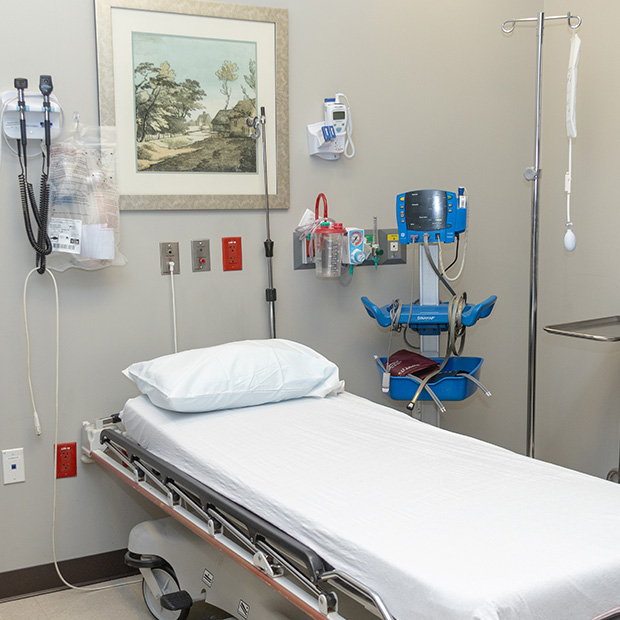
Emergency Kidney Stone Treatment in Dallas
Comprehensive 24-Hour Care for Kidney Stones in Dallas
Kidney stones can be extremely painful to pass. In some cases, they can cause serious complications that require medical attention. If you think you are suffering from a kidney stone and have severe symptoms, or something just feels wrong, then please come to Advance ER right away. We have two emergency care clinics in Dallas with no wait times, so you can get the medical attention you need when you need it – 24 hours a day, 7 days a week, and 365 days a year.
Call (214) 494-8222 or contact us online if you have any questions about our emergency kidney stone treatments in Dallas.
Identifying Kidney Stone Symptoms
A kidney stone is a mineral build-up that travels from inside the kidney and through the urinary tract to the bladder, where it can be expelled through urination. As the kidney stone passes through each organ and down the urinary tract, it can irritate soft tissues and trigger a variety of symptoms.
Common kidney stone symptoms include:
- Severe or sudden pain down the back and side
- Sharp pain in the lower abdomen or groin
- Radiating pain in the abdomen
- Pain or burning feeling while urinating
- Discolored urine
- Odorous urine
- Need to urinate often
- Feeling the need to urinate but cannot
- Nausea and vomiting
- Fever and chills
Understanding Kidney Stone Complications
Kidney stones can pass on their own, but they don’t always do. Some kidney stones can become lodged in the urinary tract, causing damage to it and surrounding tissues. Other kidney stones can damage the kidney, ureter, or bladder, causing serious complications.
Emergency medical care may be needed for a kidney stone if you suffer or notice:
- Severe pain that never gets better
- Sharp pain that makes it impossible to sit comfortably
- Blood in your urine
- Difficulty urinating, especially after several attempts
- Nausea and vomiting with other symptoms
- Fever and chills with other symptoms

-
 The Advance ER Team Providing Reliable Medial Care
The Advance ER Team Providing Reliable Medial Care -
 ER Insight Vital Knowledge for Life-Saving Moments
ER Insight Vital Knowledge for Life-Saving Moments -
 ER Knowledge Hub Your Source for Expertise on Health, Emergencies, and Beyond
ER Knowledge Hub Your Source for Expertise on Health, Emergencies, and Beyond
Get Medical Care Right Away for Serious Kidney Stone Symptoms
Do not hesitate to seek emergency medical treatment if you are experiencing sharp abdominal pain or can’t urinate. If a kidney stone cannot pass on its own, then it could cause unsafe complications. By coming to Advance ER right away, you can let our medical professionals diagnose the issue and provide medical care before symptoms worsen. Remember: We are open 24/7/365 and never have any wait times for our emergency care patients.
Visit one of our Dallas emergency kidney stone treatment centers now. Or call (214) 494-8222 if you have any questions about kidney stone treatments.
Kidney Stone FAQ
What is a kidney stone?
A kidney stone is a hard deposit of minerals (mostly salt and calcium) that build up inside the kidneys. They are naturally occurring but can be more likely in people with high sodium diets, who are medically obese, who have a family history of kidney problems, or who recently had gastric surgery.
Can kidney stones be prevented?
The simplest way to prevent a kidney stone from forming is to drink plenty of water or beverages without sugar or sodium. Each day, the average person should drink about 12 cups of water to keep a good level of hydration that reduces the risk of kidney stones.
Will I need hospitalization for a kidney stone?
Most kidney stone patients do not need hospitalization, only IV treatments and painkillers. If your kidney stone is severe enough to require surgery, though, you could be hospitalized.
Can diet impact kidney stone formation?
Yes, diet plays a significant role. High intake of sodium, animal protein, and certain foods rich in oxalate (like spinach, rhubarb, and chocolate) can increase the risk of stone formation, especially for certain types of stones.
How are kidney stones diagnosed by a medical professional?
Diagnosis typically involves a physical exam, review of symptoms, urinalysis, blood tests, and imaging studies such as a CT scan (which is the gold standard), ultrasound, or X-ray to locate and size the stone.
Are all kidney stones made of the same material?
No, there are several types of kidney stones. The most common are calcium oxalate stones, followed by uric acid stones, struvite stones (often linked to infections), and cystine stones (a rare genetic disorder).
Can kidney stones recur after treatment?
Yes, kidney stones have a high recurrence rate. Without preventative measures, about 50% of people who have had one kidney stone will develop another within 5-10 years. Lifestyle changes and sometimes medication can help prevent future stones.



[8].2112210947272.png)